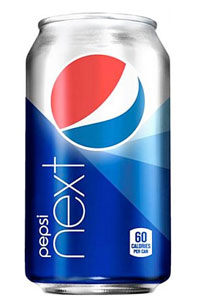 At the Beverage Digest Wall Street Smarts conference yesterday, Massimo d’Amore, CEO, PepsiCo Beverages America confirmed the rumors that Pepsi will be launching a mid-calorie soda. D’Amore described the new beverage as “a next-generation cola” that cuts calories and sugar without sacrificing taste, the major stumbling block for mid-calorie sodas of the past. In 2004, PepsiCo launched the 70-calorie Pepsi Edge, which proved unsuccessful and was pulled from the market in the following year.
At the Beverage Digest Wall Street Smarts conference yesterday, Massimo d’Amore, CEO, PepsiCo Beverages America confirmed the rumors that Pepsi will be launching a mid-calorie soda. D’Amore described the new beverage as “a next-generation cola” that cuts calories and sugar without sacrificing taste, the major stumbling block for mid-calorie sodas of the past. In 2004, PepsiCo launched the 70-calorie Pepsi Edge, which proved unsuccessful and was pulled from the market in the following year.
“The way we were formulating products 10, 20 years ago is different from how we formulate them today,” said d’Amore. “The sweetener system is different; some of the ingredients are different. It’s a great-tasting product.” He explained that the product has been created for customers who currently drink full-calorie soda, but are looking to cut back on their sugar consumption. The product will be tested in two locations this summer, in Iowa and Wisconsin.
The move may be an attempt to keep consumers from switching from cola to other beverages altogether, as the health problems associated with soda consumption gain more public attention. “When some consumers switch from regular colas, they try diets, don’t like the taste and move on to water or other categories,” John Sicher, Beverage Digest’s editor and publisher, told Advertising Age. “The theory is that a mid-cal can taste better than a diet to some consumers and appeal to consumers who are moving away from the regular brands.”
The new product is also fitting with PepsiCo’s overall strategy to become “the good company,” in the words of CEO Indra Nooyi. She says the company must strive to make its products healthier, yet many of their modifications revolve around highly processed and newly engineered ingredients.
Pepsi Next will have 60 percent less sugar and 60 percent fewer calories than regular Pepsi, and is expected to be sweetened with a combination of artificial sweeteners and high fructose corn syrup although the actual ingredient list has not yet been disclosed. Splenda currently appears to be PepsiCo’s zero-calorie sweetener of choice, which can be found in all Propel beverages, Pepsi One, Diet Mountain Dew and Amp Energy. However, PepsiCo also has products with stevia-derived sweeteners, such as SoBe Lifewater.
 If consumers who typically drink regular soda would indeed switch to this product, they might reduce some of the risks associated with consuming sugary drinks. However, most nutrition experts would argue that limiting soda intake altogether is a better choice. Mary Hartley, RD, MPH of Calorie Count, says that from a strictly caloric standpoint, the mid-calorie soda would be better, but “it still has all those additives and preservatives.”
If consumers who typically drink regular soda would indeed switch to this product, they might reduce some of the risks associated with consuming sugary drinks. However, most nutrition experts would argue that limiting soda intake altogether is a better choice. Mary Hartley, RD, MPH of Calorie Count, says that from a strictly caloric standpoint, the mid-calorie soda would be better, but “it still has all those additives and preservatives.”
Pepsi’s mid-calorie soda may be able to fill a niche in the market, but it still raises health concerns. Several studies have linked frequent consumption of sugar-sweetened sodas to diabetes and obesity while other research has suggested health problems caused by diet soda, such as kidney failure. Hartley also brings up the concern that diet soda can increase the body’s tolerance for sweetness. “In other words, it keeps your sweet-tooth revved up,” she explains. Debate rages over whether or not diet soda can be linked to diabetes and heart disease, however the fact remains that these beverages do not provide the body with any kind of nutrient. “The calories that it does have, even if they’re fewer, are still empty calories,” says Hartley. “It’s just not a nutritious drink.”
Imaga via CanMuseum.com.
Also Read:
Forget Drinkified: How PepsiCo Could Build a Better Snack
